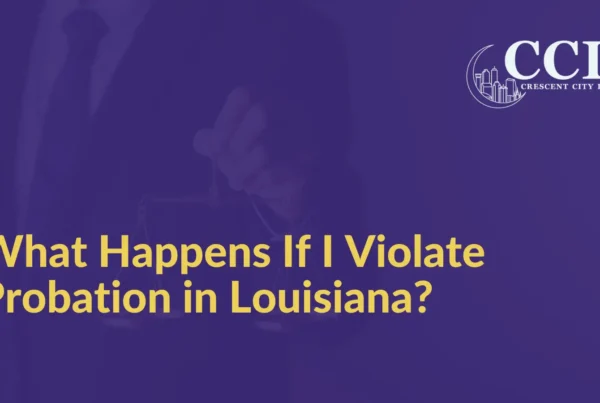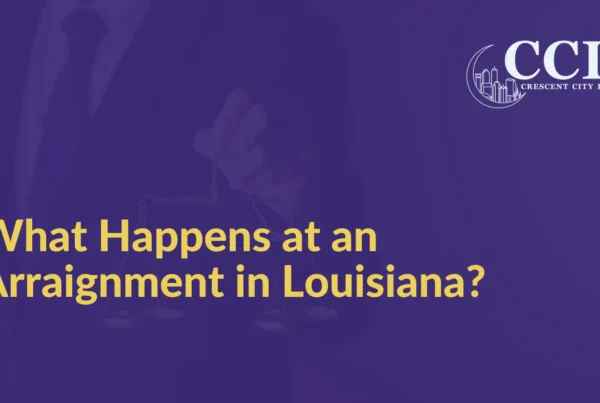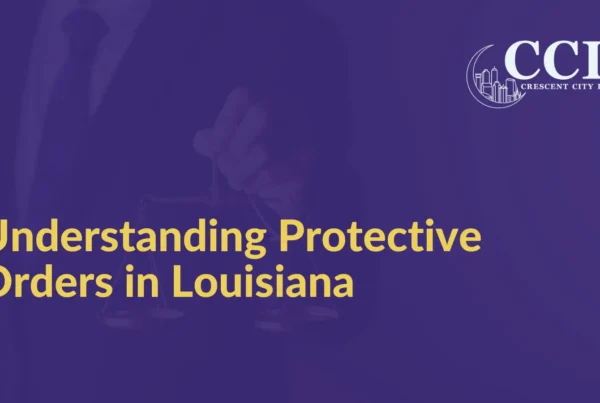Getting arrested is never fun.
One moment you are out there living your life, and the next moment you’re handcuffed in the back of a police car wondering how this happened. You’re also probably thinking, “How am I going to get out of jail to fight these charges?”
The simple answer is that you need to make bail. Your bail amount is usually set by a judge based on the seriousness of the offense.
From our criminal defense lawyers at Crescent City Law, here’s what you need to know about bail if you’ve been arrested in New Orleans.
Can someone else pay my bail?
In most cases, the bail is MORE than you can afford, so you’ll have to contact a bonding company to put up the money for you.
A bondsman is like an insurance agent. They buy bonds from insurance companies and sell them to you for a portion of the total. In exchange for paying that portion, the bonding company will insure you for the remainder of the bond. If you make all of your court appearances, the bond will never be paid to the court. But, if you go on the run, the bond company guarantees they’ll pay the total amount to the court.
- To get started, you’ll need to contact a bonding company.
- Then, you’ll need to pay for a bond that usually has non-refundable fees.
- After the deposit is paid, the bonding company will contact their insurance to purchase a Power of Attorney.
- Then, your bonding company will deliver the Power of Attorney to the court (or your local jail) to ‘pay’ to bail you out.
Why do some people stay in jail after they paid their bond and the bondsman delivered the POA to the court?
The truth is that getting out of jail is much more complicated than getting brought to jail.
First, the court will have to verify and file the bond. Second, the jail will check to make sure you don’t have any other warrants. Then, they need to prepare documents for you about your release and give you a subpoena for your next court date. Finally, they need to return your property to you.
In most cases, it takes about 4-6 hours between the time someone’s bond is posted and they are physically released from jail, but every case is different.
Once I’ve made bail, what are the conditions of my bond?
I know being in jail can be rough. I know because I’ve been there.
I know what it’s like to be arrested. I know the feeling of being stuck in the cold windowless jail, counting every second while I wait my turn to be released. I know how frustrating the process of being released can be. I know the feeling of being handed a STACK of papers with all kinds of new information can be overwhelming.
But I also know how warming the sun felt when I stepped out of the icebox of the jail.
Now, I want to tell you what you need to do now that you’re out. First, I always tell my clients to eat some junk food from your favorite fast food restaurant and take a nap. You need to get your energy back.
After you’ve got a full stomach and you’re rested, there are some things they probably didn’t tell you when you were released.
Bail release conditions in New Orleans
First, there are conditions of your release and violating these conditions could lead to the revocation of your bond (and your return to jail during while you await the resolution of your case).
- You can’t commit any other crimes while you’re on bond. Arrest for a new crime will result in the revocation of your bond.
- You can’t do drugs while you’re on bond (Note: Most drugs are illegal without a prescription). The judge has the ability to require you to submit to a drug test at any time while you’re on bond. A positive drug test will result in the revocation of your bond.
- You shouldn’t have any negative contact with the police while you’re on bond. Don’t pick arguments with the police, don’t hang out with people who are committing crimes, and drive safely – even a traffic ticket can be considered negative contact with police.
- You (or your lawyer) must make all of your court appearances. If you miss a court appearance, the District Attorney will ask the judge to issue a warrant for your arrest and court may revoke your bond.
- Follow any special conditions of your bond. In some cases, your bond might set a curfew, prohibit you from contacting the victim, or require you to attend classes. Your failure to abide by these special conditions will result in the revocation of your bond.
Contact Crescent City Law defense lawyers today
If you, or someone you know, was recently arrested and has questions about their arrest, bond, or their charges, please contact our office to schedule a free consultation to discuss the case.






